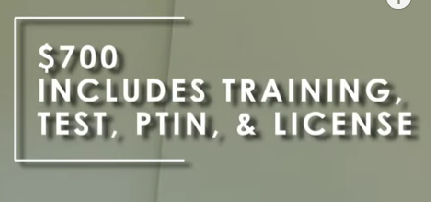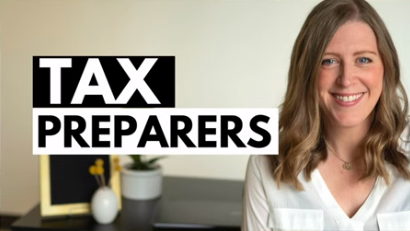6 Simple Steps to Become a Tax Preparer
Are you interested in learning about the steps required to become a tax preparer? I do not currently prepare taxes as a bookkeeper, but it is something I have thought about adding to my service list for clients. Because this is a topic I get a ton of questions about, I did a ton of research and talked to my friend Amy Beyer, who is a tax preparer, to help bring you all the information you need to get started!
In order to become a tax preparer, there are six critical steps that you must complete, and I will walk you through each one:
complete a training course
apply to the state board
pass an exam
apply and pay for your PTIN
apply and pay for your license
find a job and complete your continuing education.
With Amy’s guidance we will go over each step in-depth, let you know how much it cost for Amy to become a tax preparer, and discuss what her schedule looks like now. Be sure to check out this free Tax Preparer Guide as we walk through how to become a tax preparer.
Download the Free Guide: Tax Preparer Guide
Watch the video here, or keep reading!
Where to Start? The 6 Steps to Become a Tax Preparer
Amy Beyer was my neighbor about 10 years ago, and she recently reached out to me to assist her in starting a bookkeeping business. I answered some of her questions and helped her get going, but as she did her own research, she came across the idea of becoming a tax preparer.
Amy saw an ad on Craigslist in late summer 2022 for H&R Block looking to hire people for the upcoming tax season. After talking with a recruiter, she decided to start taking the following steps to become a tax preparer.
Training
Amy started the process by taking the H&R Block training program. In this program, Amy did 80 hours of classroom time, which took her about 3 months. After completing her hours, Amy spent the next month studying for the tax preparer exam.
This program cost Amy $700, which included the training, exam, and licensing. However, she was able to get some of this cost subsidized by H&R Block with the intent that she would be working with them after getting her license.
Apply to Take the Exam
After receiving your certificate of completion from a training program, you will be able to apply to the tax practitioner board and take the exam. This board will look over your training and verify that you have completed everything necessary to take the test.
Amy shared with me the link to the Oregon Board of Tax Pracitioners, which provides information on the tax preparing laws in our state. With a quick Google search, you could find something similar for your state. There is a lot of great information on this page that I think you will find helpful.
Website: Oregon Board of Tax Practitioners
Pass the Exam
Your next step to becoming a tax preparer is passing the exam. The exam itself is 3 hours long, and you need to achieve a 75% or higher to pass. When Amy took her test, she was allowed to bring approved notes with her; however, there are regulations as to what you can bring into the test, so be sure to look into this before you go.
Apply & Pay for PTIN
Your PTIN is your preparer tax identification number, and you will want to apply for this after passing your state board exam. The fee will vary from state to state, but in Oregon it is $60.
Website: PTIN Information from the IRS
Apply & Pay for License
Next you will want to apply for your license. For this, you will need to fill out a form and pay $85. Before you fill out this form, you will need to have your PTIN.
Find a Job & Continuing Education
Depending on where you live, there are different types of tax preparers. In some states you can build your client base right away, and in others you may need to work for a company and gain more experience prior to branching out on your own. I have a video you can watch where I talk more about this: What does a tax preparer do? Types?
Along with finding a job as a tax preparer you will need to complete 30 hours of continuing education every year. You also need to pay to renew your license per your state's requirements.
Intuit Accountants also has some helpful information and tools to help you get started as a tax preparer: https://accountants.intuit.com/tax-software/
Amy’s Experience With H&R Block as a Tax Preparer
H&R Block recruited Amy, and after completing her tax preparer license, they hired her on to work for them. I will give you a little more insight into what her job looks like now.
When first starting off, H&R Block requires employees to work in the office, which Amy found helpful. While working with clients, Amy was able to ask her supervisor questions and get answers quickly. Now that Amy has experience, she is able to work remotely from home.
I feel this is the best of both worlds!
You can get trained by a company and gain the knowledge you need; however, once you have the skills necessary, you can work remotely with flexible hours. Amy, currently working nights and weekends, was able to choose her hours for what best fits her schedule with a little one at home. Along with that, Amy’s job has different levels of certification, so while her baby is taking naps throughout the week, Amy can work on additional training and move up within the company. Her long-term goal is to become an enrolled agent or CPA.
What does this mean when it comes to bookkeeping and tax preparation? As a tax preparer, Amy realized she did take a small pay cut, but she also discovered there are more opportunities for growth. For example,H&R Block will set you up and support you along the way. This isn’t always found in the bookkeeping world (which is why I try to help you!).
Benefits of Becoming a Tax Preparer
Becoming a tax preparer opens doors to potential clients as a bookkeeper. By initially working with these businesses for a few hours, impressing them with your skills and earning their trust, you increase the likelihood of being hired for long-term bookkeeping responsibilities.
Like bookkeeping, tax preparation could also be a great side hustle for those who want to earn a little extra income. It is flexible, seasonal work that could be a great fit for your first job out of college, something to do in retirement, or if you’re a parent who wants to stay home with your kids.
Helpful Information in Becoming a Tax Preparer
Amy mentioned that she had past retail experience that helped her in the customer service part of her job as a tax preparer. It’s also good to note that because tax preparation is seasonal, you most likely won’t receive benefits (medical or dental).
Don’t forget to download the free Tax Preparer Guide if you’re interested in learning more about how to become a tax preparer, and check out Intuit’s resources for tax preparation.
I hope you found Amy’s story helpful as you consider tax preparation as a service you could provide. I’d love to hear if you either have your tax preparer license or if you’re interested in adding it to your bookkeeping services. What’s been your experience?
Do you want monthly tips to grow your bookkeeping business?




